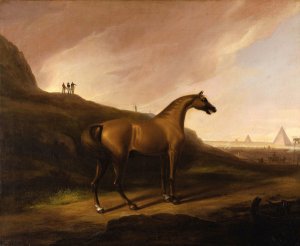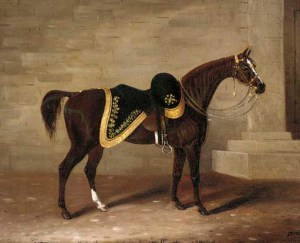“Mules are always boasting that their ancestors are horses.”
I read that somewhere and busted out laughing. It’s true, isn’t it? And mules aren’t the only ones who do it. I do it. You do it. We all do it.
And it’s nothing to be sheepish about either. It’s easy to understand why we light up when we find an impressive, well-known ancestor.
At its most basic, it’s because we all like a good story. Life is just a series of interconnected stories. And telling those stories is the basis of communication.
The joke, “Mules are always boasting that their ancestors are horses” is about communication. So I’ll keep my comments to the way we communicate our interest in genealogy to others.

Man o’War, one of the greatest racehorses of all time. In his career he only lost one race.
When we tell people that our ancestor is a “horse” – someone who impresses people, like George Washington or Marie Antoinette or Man O’War (see photo at right), we’ve suddenly got a conversation. We’ve made a connection.
They know just enough about that historical person to be “pre-interested.”
Conversation is about finding topics of common interest, after all, and if you don’t have anything to say except that you’re related to a person who lived a long time ago, the only response you’ll get is the back of your dinner partner’s head as he turns to talk with the person on his other side.
But talking about your “horses” isn’t all about impressing other people. In fact, it’s not even primarily about impressing other people.
My eyes glazeth over after a spell spent double-checking demographics on the umpteenth ancestor in my family tree.
If you’re at all human, you probably feel the same.
We’re like the dinner partner. We don’t want to bore ourselves. Saying you’re related to Sir Isaac Newton (as I’ve been saying since I was a child) is just a shorthand way of telling someone how interesting, how rewarding it is to research your family’s history.
But unlike our fictional dinner partner, we’re just as interested in the no-names as we are the famous ones.
I’m every bit as interested in my ancestor the Reverend John Fitch, who is not well known, as I am in Isaac Newton.
But I can’t expect anyone else to be interested in him…unless I know enough about him to weave an interesting story. I know what gets a reaction – and follow-on questions – and what doesn’t.
In fact, I’m more interested in the good Reverend Fitch, because his story is not well known. I had to work hard to find out that he moved a congregation into the wilderness of Connecticut in the mid-1600s. That he was a friend of Uncas, the chief made famous in “Last of the Mohicans,” and that he helped get Mohicans on the Colonists’ side in King Philip’s War.” That’s a story or few.
We genealogists have to be obsessed, otherwise we won’t find anything more interesting than dates and names.
We are more than kin connectors or clan catalogers, family finders, or pedigree-ophiles.

The Lone Ranger saved a wild horse from an enraged buffalo, and in gratitude the horse gives up his freedom to become the Lone Ranger’s faithful steed, Silver.
We are storytellers, and we have to be blood hounds for the details, because therein lies the story.
I’m going to keep looking for the horses in my past. I’ll no doubt find some jackasses* as well, but I bet a few of them will make interesting stories too.
Note: A mule is the offspring of a horse and a donkey, or jackass.




So glad we can all reap the benefits of your digging and story weaving!
Thanks for the encouragement, little sister. 🙂